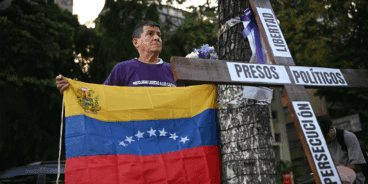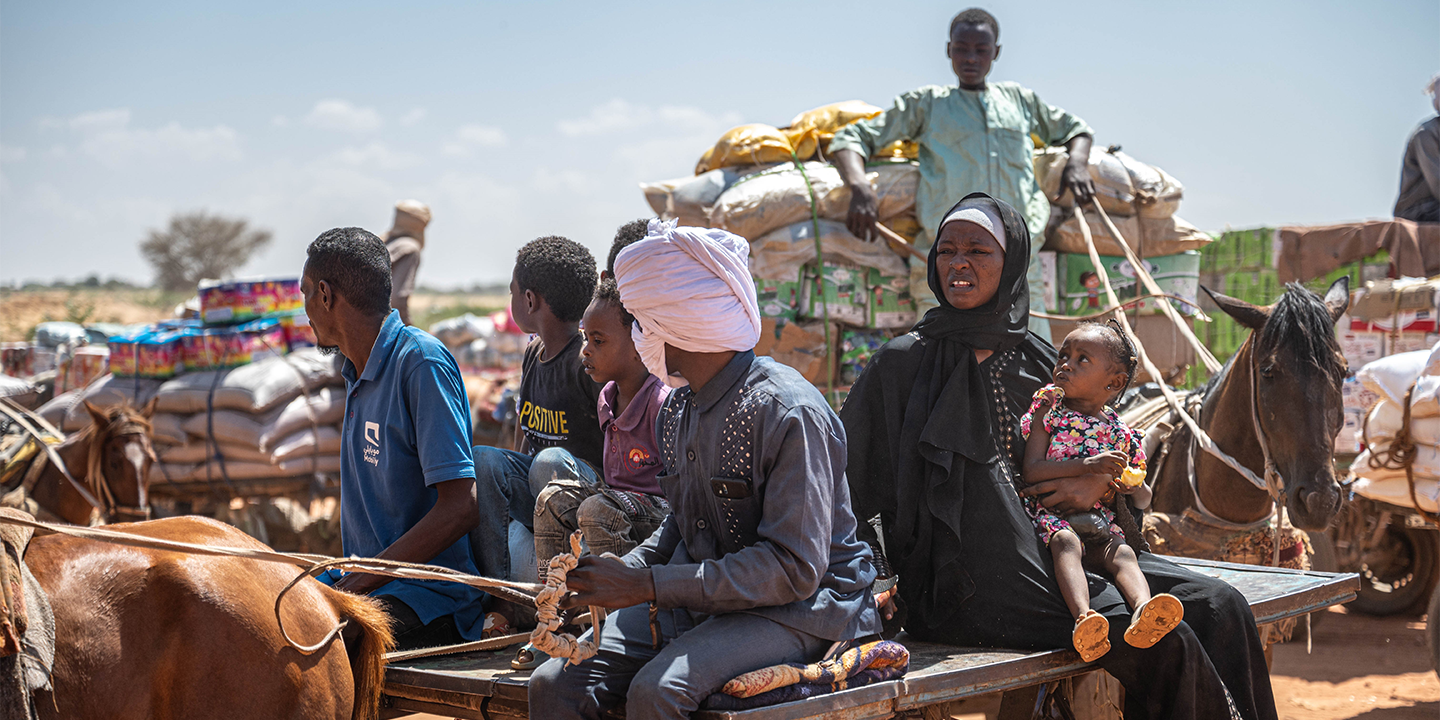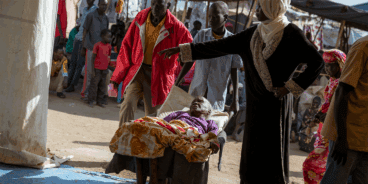

Atrocity Alert No. 451: Sudan, Israel and the Occupied Palestinian Territory and Central Sahel
Atrocity Alert is a weekly publication by the Global Centre for the Responsibility to Protect highlighting situations where populations are at risk of, or are enduring, mass atrocity crimes.
AT LEAST 75 KILLED IN MOSQUE ATTACK AS CRISIS ESCALATES IN EL FASHER, DARFUR
On 19 September the paramilitary Rapid Support Forces (RSF) carried out a drone strike on a mosque during morning prayers, near the Abu Shouk displacement camp in the Daraja Oula neighborhood of El Fasher, in Sudan’s North Darfur region. The attack killed at least 75 people, making it one of the deadliest single incidents the city has endured since the conflict began in April 2023. Videos shared on social media show the collapsed structure and the heavy toll on civilians, with rows of body bags and bodies visible among the rubble. In a statement on 20 September UN Secretary-General António Guterres expressed grave alarm over the rapidly deteriorating situation, noting, “with fighters advancing deeper into El Fasher, there is a rising risk of ethnically motivated violence.”
The strike underscores the rapidly intensifying conflict in El Fasher. A day earlier, on 18 September, the Yale School of Public Health’s Humanitarian Research Lab (HRL) warned that the city is on the verge of falling to the RSF, assessing that it is “highly unlikely that another outcome is possible” without immediate reinforcements from the Sudanese Armed Forces (SAF). The HRL further cautioned that the RSF is “highly likely” to perpetrate “systematic mass atrocities” in El Fasher and Abu Shouk camp during and after capturing the city. The latest satellite imagery identified at least 82 RSF vehicles entering the camp.
El Fasher has been under siege by the RSF since April 2024, with non-Arab communities deliberately targeted, civilian infrastructure and displacement camps systematically destroyed and critical supply routes blocked, while attacks on surrounding areas continue to escalate. These calculated assaults have sparked urgent warnings of potential genocide, with non-Arab communities facing an imminent and severe threat of ethnically motivated killings and mass atrocities. Following the attacks on Zamzam camp in April 2025, Médecins Sans Frontières reported witness testimonies of RSF fighters openly discussing plans to “clean El Fasher” of non-Arab residents, with the Zaghawa community specifically targeted.
The international community is obligated to prevent and punish genocide and must take action to save civilian lives in Darfur. As heads of state and government gather in New York this week for the opening of the 80th session of the UN General Assembly, diplomatic pressure must intensify to bring an end to the conflict, including by compelling external actors, such as the United Arab Emirates, Egypt, Turkey, Russia and Iran, to halt their support to parties to the conflict. The international community should press the RSF and SAF to ensure that attacks on civilians cease immediately. The UN Security Council must urgently convene and consider adopting a robust resolution with concrete measures to protect civilians and prevent further violence.
UN REPORT CONCLUDES ISRAEL IS COMMITTING GENOCIDE IN GAZA
The latest report by the UN Independent International Commission of Inquiry (CoI) on the Occupied Palestinian Territory, including East Jerusalem, and Israel concludes that Israeli authorities and forces have committed and are continuing to commit genocide in Gaza. The CoI determined that Israel has committed at least four acts prohibited under the Genocide Convention, namely: killing members of the group; causing them serious bodily or mental harm; deliberately inflicting on the group conditions of life calculated to bring about its physical distribution in whole or in part; and imposing measures intended to prevent births. Statements made by Israeli authorities constitute direct evidence of genocidal intent, while the conduct of Israeli forces provides circumstantial evidence indicating that such intent is the only reasonable inference that can be drawn from the totality of the facts.
Despite growing international scrutiny of its actions, Israel remains intransigent and is moving forward with its offensive in Gaza City. Ongoing ground operations and airstrikes are forcibly displacing thousands. Many Palestinians, however, have chosen to remain in Gaza City after enduring multiple waves of forced displacement over the last two years.
The CoI’s report adds to the growing genocide declarations by prominent rights and humanitarian organizations, scholars and legal experts. In parallel, an increasing number of member states are moving to support South Africa’s case at the International Court of Justice concerning alleged violations by Israel of its obligations under the Genocide Convention. The Court has already issued provisional measures on three separate occasions, ordering Israel to prevent the commission of genocide. On 19 September Brazil filed a declaration of intervention, joining Spain, Chile, Colombia, Türkiye, Ireland and others in supporting South Africa.
Meanwhile, in the past week, Canada, Australia, the United Kingdom and France, among other western states, formally recognized Palestinian statehood, following renewed efforts to revitalize discussions on a two-state solution. In a bid to suppress momentum for recognition, on 29 August the United States announced its refusal to grant visas to the Palestinian delegation to attend the opening of the 80th session of the UN General Assembly, in violation of the UN Host Country Agreement.
Navi Pillay, Chair of the CoI, stressed, “The prevention of genocide is not a matter of discretion. It is a legal and moral obligation, and it admits no delay. The law requires action. Our common humanity demands it.” The international community’s inaction and complicity have enabled Israel’s genocide in Gaza. Member states must replace cautious incrementalism with unconditional adherence to the moral imperatives, political commitments and legal obligations demanded by the Responsibility to Protect, including by enforcing a comprehensive arms embargo on Israel, acting under UN General Assembly resolution 377 (V) to establish a multinational protection force and deploying a multilateral humanitarian diplomatic convoy to confront the famine in Gaza and break the siege.
ESCALATING ABUSES AND SHRINKING ACCOUNTABILITY IN THE CENTRAL SAHEL
Recurrent attacks by armed Islamist groups and intensifying clashes between militants and national security forces in recent months have increasingly placed civilians across the Central Sahel at grave risk. In Burkina Faso, Mali and Niger, groups affiliated with al-Qaeda and the so-called Islamic State have escalated assaults on civilians and infrastructure, and inflicted collective suffering through sustained blockades that deprive communities of essential resources. The UN Independent Expert on the situation of human rights in Mali has described the crisis as a “regime of terror” imposed through sieges, killings, kidnappings and sexual violence. Many incidents go unreported due to insecurity, restricted access and fear of reprisals against survivors and witnesses.
Worryingly, the so-called Islamic State-Sahel Province (ISSP) has escalated attacks on civilians in western Niger’s Tillabéri region since March 2025, perpetrating likely war crimes. According to a Human Rights Watch report, in at least five attacks, ISSP summarily executed over 127 villagers and Muslim worshipers and burned and looted dozens of homes. Witnesses said the Nigerien army failed to respond to repeated warnings and ignored calls for protection. Most recently, on 15 September, 22 villagers were killed when armed men opened fire during a baptism and later surrounded a neighboring village.
While addressing the UN Human Rights Council on the situation in the region, High Commissioner Volker Türk warned that “military authorities are…carrying out arbitrary arrests, detentions, forced recruitment, and censorship of dissenting voices, as part of their highly militarized response to armed extremism.” Security forces have conducted major counterinsurgency operations, but have also increasingly targeted civilians. As of 9 September, the UN Human Rights Office recorded hundreds of extrajudicial executions, arbitrary arrests and detentions, enforced disappearances and abductions by all parties in Mali this year alone. These abuses aggravate ethnic tensions, encourage militant recruitment and contribute to prevailing impunity.
Authorities in Burkina Faso, Mali and Niger have made little progress in holding accountable members of government security forces, armed groups and others responsible for grave crimes. In early 2025, the three countries officially left the Economic Community of West African States, raising serious concerns about access to justice for victims of serious human rights abuses. The withdrawal removes a key regional avenue for accountability, at a time when violations and abuses are widespread and national courts are increasingly inaccessible. On 22 September the military authorities announced their withdrawal from the International Criminal Court (ICC) – further weakening avenues for justice and redress for victims of atrocity crimes.
ICC member states should urge Burkina Faso, Mali and Niger to uphold the rule of law, support accountability and remain members of the court. Governments must fulfill their obligations to impartially investigate and prosecute international crimes. All national forces must ensure operations strictly comply with international law, so that counterterrorism objectives do not come at the expense of human rights and civilian protection.
Related Content


Atrocity Alert No. 462: Sudan, Haiti and Mozambique
